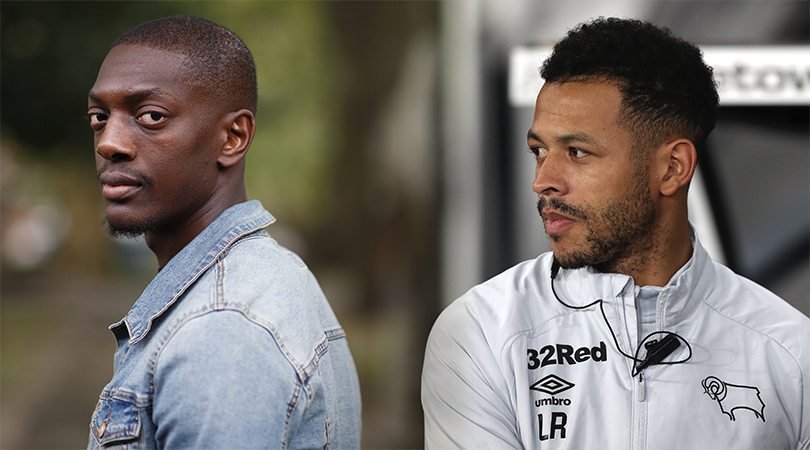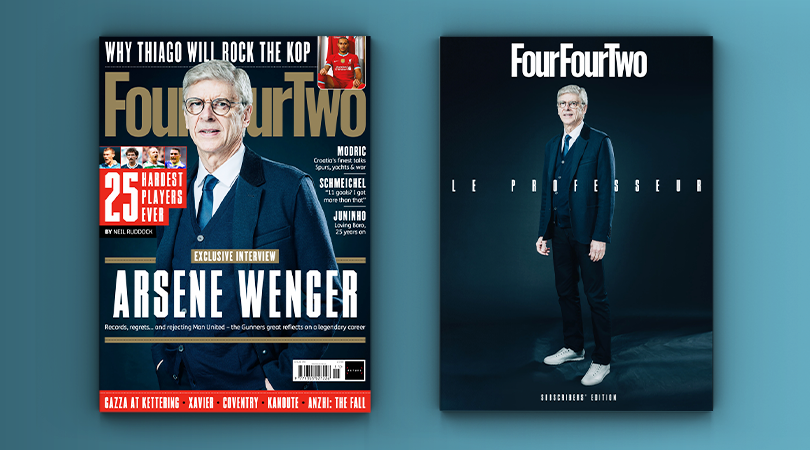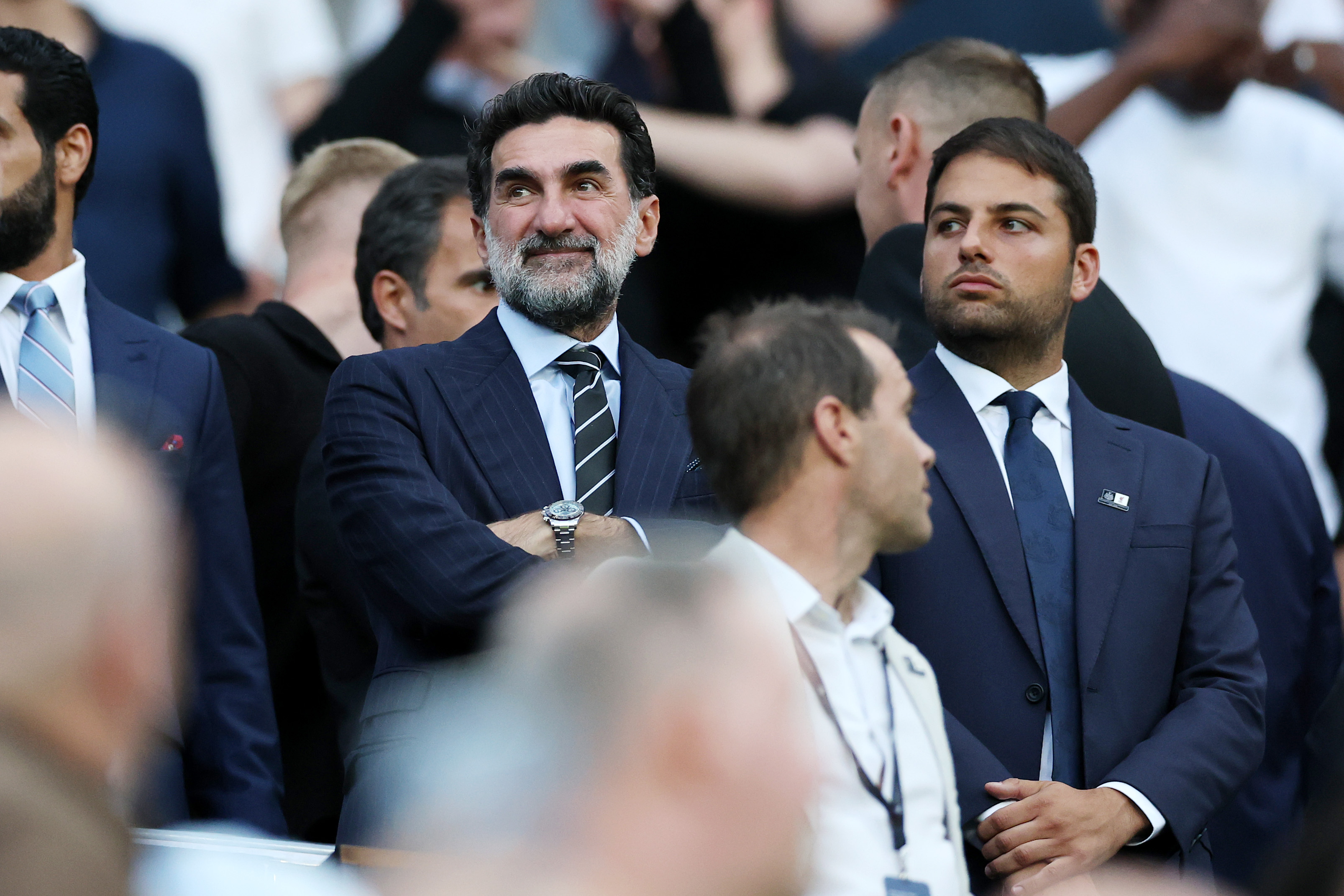"As soon as racism affects the money, it will be gone" – Marvin Sordell and Liam Rosenior discuss racism in football
Twitter isn’t the place to find a constructive conversation on the Black Lives Matter movement. Instead, FFT had a frank discussion with Marvin Sordell and Liam Rosenior, ex-pros and now on the FA’s Inclusion Advisory Board

This feature first appeared in the August 2020 issue of FourFourTwo magazine. Subscribe today and for just £9.99 a quarter
The Black Lives Matter campaign may have morphed from worthy cause into political grenade in the space of a few weeks, but its overriding mantra should always remain at the heart of any discussion. However, as statues have been toppled and peaceful protests have been overshadowed by retaliation, it’s hard to shake the feeling that ulterior matters have distracted from the original, simple message.
But cutting through all the noise is like cycling through a bog: it’s hard work, and you’re going to get stuck. That’s why FFT enlisted former pros Marvin Sordell and Liam Rosenior for a Zoom chat about the realities of life from an ethnic minority background, and where football can improve. Topically, Rosenior went to Colston’s Primary School in Bristol – (formerly) named after Edward Colston, the 17th-century slave trader whose statue was, in June, pulled down by protesters and then thrown into the harbour.
In May, both were among seven additions to the FA’s Inclusion Advisory Board. While retirement has taken the two former players down very different directions – Rosenior, 36, into the position of specialist first-team coach at Derby; Sordell, 29, now a producer, writer and multi-skilled head honcho of ONEIGHTY Productions – their life experiences make for essential reading.

We all have much to learn...
FFT: How did you both come into your roles on the FA’s Inclusion Advisory Board?
ROSENIOR: I’ve known Paul Elliott [chair of the board] for a long time and was honoured when he asked me to be part of it. I’ve always wanted to influence things in what I do, so being a positive role model, as a footballer or coach, means a lot to me. It’s a huge honour to have a voice in how we’re going to take our game forward in this country.
The best features, fun and footballing quizzes, straight to your inbox every week.
SORDELL: I was quite hesitant at first. I didn’t really know what impact I’d be able to have, and whether it was going to be a token role. I’ve spoken out about the FA, UEFA and FIFA a lot over time – not just on their approaches to racism but other subjects that are personal to me – and been pretty critical. Eventually, I thought I’d be a hypocrite if I didn’t take the opportunity. If you want to make change, you have to be a part of change.
FFT: Liam, how did you feel when you watched Edward Colston’s statue coming down?
MS: Did you know about that history when you were at the school?
LR: I did. Since I was a child, there have been conversations about him and the things he represented in Bristol. My family comes from Sierra Leone in west Africa. I don’t know the number but I believe around 80 per cent of slaves were either transported from or came through there, and my dad’s ancestors were slaves. As a child, though, I was fortunate to be made aware and proud of both my white and black heritage. Seeing the statue brought down actually sparked something in me a lot stronger than I thought it would. Speaking to friends who went to the same school – some white, some black – they were all pretty happy about it. It has sparked some unbelievable debates that we haven’t had for a long time about where we are in this country right now. Whether we like it or not, slavery has played a huge part in the UK and America. It’s funny, because my grandmother lives in Hull, where the William Wilberforce [a leader of the movement to abolish slavery] museum is, and we would visit there regularly. It was my mum who was most enthusiastic about me learning about my black heritage. She’s told me stories about people literally spitting at her as she pushed me in the street. Education is so important for combating racism right now. It creates an opportunity to have empathy for other individuals who don’t have the same background.
FFT: Marvin, how was it growing up in London with a very different demographic? Did being black ever feel like a disadvantage?
MS: I can’t lie: it did. One thing that people may not understand is the microaggressions that exist. They might think racist incidents are just one-offs, but if that was the case then maybe they wouldn’t affect us so much. I’ve had a wide range of experiences, and being a footballer was my escape from the world. Society expects certain things of us, but when I went out on a football pitch, it was different. “You’re not like the rest of them,” is what I’d often hear people say. When I present myself as an intelligent, thoughtful and articulate person, I’m considered ‘different’ as a black person, as opposed to just being myself.
LR: That’s a really good point – it’s the kind of unconscious bias that goes unchallenged. It’s very difficult to explain what that feels like. If I first meet someone or speak on the television, they say to me with surprise, “You speak so well”. I’ve even been told I “speak white” by other black people.
MS: I have as well!
LR: There’s a preconceived idea that, based on the colour of your skin, you’re meant to be a certain way. We’re pigeonholing people. We can speak about overt racism, where it’s in your face, but it’s far more than that.
FFT: What do you both think of the Black Lives Matter activity over recent months? Why do we need it?
MS: When we talk about ‘Black Lives Matter’, that’s just it – it’s a statement on its own. It’s only because it doesn’t have the word ‘too’ at the end that some people feel triggered. Sometimes I fall down the rabbit hole of checking comments on Twitter, and it’s very strange. You’ll see things like, “It’s so PC” and, “Why is everything now racist?” However, it’s not that everything is now racist – it’s that our whole society was built on racial bias. Now everything’s coming to light and it’s too much change for some people. It’s not that it’s PC or left-wing. If you took individual situations and asked people, “Is this all right?” then we would start to appreciate how many harmful things exist. Take the Colston statue: I had absolutely no idea about his background in slavery, and yet this situation has brought that to light now. People speak about Black Lives Matter as an organisation, but it shouldn’t be anything more than a phrase. It’s people just saying, “Please treat me like I matter”. That’s it.
LR: The people who are against it have not lived those experiences. How can you expect people to understand something they don’t have any comprehension of? It’s not their fault. What we really need to be fearful of is people wanting to be more politically correct, and being fearful of saying the wrong thing. We want open conversations. They may be uncomfortable, but that’s OK. It’s better than saying, “I don’t have any knowledge about this, I don’t understand why black people feel their lives don’t matter, I’m not going to say anything and I just think it’s wrong”.
FFT: Have either of you had discussions with former team-mates about these issues in the past?
LR: I’ve spoken to players throughout my career, white and black, about the use of the n-word in rap music and what it represents. The question has always come: “Why is it OK for a black person to say it but not a white person?” It’s because 400 years of history are connected with that word.
MS: It’s incredible that’s even a question, to be honest...
LR: Actually, to me it’s not – because where is slavery in our curriculum? It’s not. So, if you are white and go through school, you have no understanding at all of what happened or where that word originates. It’s not people’s fault. Actually, I liked getting that question because it was then: ‘OK, we can talk about this’. Without asking it – being unafraid to be perceived as racist – that conversation would never have happened.
FFT: Liam, what does it mean to be among the next generation of black coaches? Why aren’t there as many as there should be?
LR: If I’m being honest, I feel like I’ve been misunderstood at times during my career; I’ve been accused of having a chip on my shoulder for asking questions on coaching, when white players would ask the same and it would be seen as a positive thing. There are so many intangible things that you can affect, being a black coach. We don’t have enough coaches who fully understand the 40 per cent of our players from black or ethnic minority backgrounds: their culture, body language, unsaid cues about how they are feeling. I feel a lot of players have been misunderstood on a cultural level.
Obviously I want to reach the very top, manage in the Champions League and win lots of titles, but I also want to help develop players from all backgrounds. I want to have an empathetic understanding of who they are, so that I can make them the best player they can be.
FFT: Are there enough black coaches doing their badges, applying for jobs? Are we losing prospective candidates who are put off?
LR: Completely. I know a black player who won the Champions League, played for their country over 100 times – he’s a huge name. He once asked me what I wanted to do when I finished playing, so I told him. He laughed and said, “Don’t bother. What’s the point? No one is going to give you a job.” That has been the attitude of players for a long time. It motivates me because I want to change it. I want to be visible and seen as a young, English, black coach who is successful. Then maybe other young players will see me and think, ‘I want to do what he does one day’.
FFT: What’s your take on the Rooney Rule when it comes to Football League hires? At least one BAME candidate must be interviewed for all managerial and coaching positions.
MS: It’s something that gets bypassed at the moment. What I’d like people to understand more about the Rooney Rule is that, as black people, we’re not looking for handouts. We don’t want to be given jobs for the sake of it. The problem is just getting into the room. In most industries, people employ people who are similar to them. If those who lead clubs are white men, they’re more likely to employ white men. If they’re not told to look outside their circle, then it’s not going to happen. The cycle will continue.
LR: I actually interviewed for a first-team job last season. I don’t know if it was part of the Rooney Rule or if I was selected voluntarily, but I do know it gave this club a different idea of what they might be searching for. It gave me an unbelievable experience, as a young, black coach interviewing for a manager’s job at a high level, and I think it changed their perceptions of me. I didn’t get the job, but it was a great experience for all concerned. I’m still in contact with some of the people who interviewed me, who were really impressed with what I had to say. From my experience, interviewing people from outside the customary background of qualified names lifts everyone’s experiences. Straight away, you’re getting a different and more diverse perspective. In a new scheme, six BAME coaches will be given 23-month work placements at EFL clubs each season. How do you both feel about that?
MS: Why do we need the placements? That’s the key question, isn’t it. There’s a reason why positive discrimination can be justified. That isn’t down to someone like me. I don’t choose these things; they have just happened during history. Now, this is what’s happening off the back of it.
LR: I think many positive things will happen off the back of those placements. There have been studies of really successful businesses – which weren’t actually based on diversity; it was just a case of ‘OK, these sectors are doing particularly well and outperforming their competitors: why?’ – and the common denominator was often the diversity of their boardrooms. It’s not just about seeing more black faces in the media or in a dugout on matchdays; it’s about giving supporters the best possible product, too.
And where is that product? It’s in the players. Raheem Sterling once said that he didn’t have many coaches he could relate to when he was growing up. Can you imagine how many players like him, who didn’t quite have his ability, that we’ve lost over the years because they didn’t have a coach who understood their challenges? Diversity is proven to be more successful in the long term.
MS: It’s about more diversity in the sense of thinking and mindfulness. If you appoint the same people all of the time, you’re going to get the same results. You’re never going to move forward, are you?
LR: You’ll have the same conversations. The only way society really progresses is through challenge and change. I’m a coach, so how do I improve? I go and watch others, because I need to see their perspective and ideas. If I just have the same idea of football for the next 20 years, I’m not going to be successful. The game is constantly evolving, but that is the same in every sector.
FFT: As men from ethnic minority backgrounds, have you ever been worried about visiting certain places?
MS: Yes – whether it was in football grounds or countries to play matches, or even going on holiday. A friend was talking about going somewhere on his stag do, and I had to say, “I’m not sure – let me see if they even have black people there.” If not, that would have been incredibly difficult. He was a friend, but he couldn’t walk in my shoes. If I went over to America now, there are only certain places I would go to comfortably.
MS: My wife was born in New York but grew up in Orlando, so we’ve frequently made the four-hour drive from Orlando to Miami. One time, we were absolutely starving so stopped off halfway at a burger joint. As we walked in to what must have been around 100 people, the whole place just stopped. We felt really uncomfortable and decided to leave straight away, but as we went to drive off, two guys stood right in front of the car, trying to stop us. I had to drive as if we were going to run them over to get out. In Miami once, I couldn’t find my passport, so I went to the police station to file a report and apply for a new one. I said to the officer, “Excuse me, I’m from England” – at which point she said, “You can’t be” and closed the shutter on me. These are everyday occurrences for people that should be unbelievable, and yet they’re not. For years we’ve had to live in acceptance of that and work around it, and I think what the Black Lives Matter movement represents is saying, ‘No, this is unacceptable’. The more that people can be empathetic, the better it is for society.
FFT: Marvin, you were on the pitch during that infamous England Under-21 game against Serbia in 2012, when monkey chants were everywhere. What do you remember of that night in Krusevac?
MS: There’s a lot to it – it felt like I was in the middle of a war zone. To be honest, I’ve never looked back at any of the footage. Why, I’m not sure – maybe, subconsciously, I just don’t want to go back. We actually qualified for the U21 Euros that night, so the celebrations were completely tarnished by all the scenes that happened before, during and after the match. I can remember at the time thinking, ‘This is insane’. You’re not surprised by the monkey chants, though, because they had been happening for years. That said, there are some places in England where you always felt, ‘I’m going to get abused today’.
LR: I represented England U21s a few times, and went through a similar experience when we played a group game against Serbia at the 2007 Euros in Holland. But what we need to do is be really honest about where we are as a country. When I was 17, I went on trial with West Ham and stayed in digs. I went for a walk to explore the local area, and outside a sports shop there was a photograph of the England team with its black players’ faces stoned out. I’m actually tired of talking about what happens when we play games in other countries, because we haven’t got our own house in order. It’s easy to deflect, because there are other dangerous and covert forms of racism in England. I don’t know how Marvin feels about it, but overt racism just doesn’t affect me any more. When I was five, I saw my dad have bananas thrown at him. When I was eight, I was called a monkey in a park. When I became a player, I got called the n-word and was sent off for retaliating. I’ve experienced so much of that, I don’t get upset about it now.
MS: If someone called me a monkey to my face, I’d be annoyed but I’d just think, ‘Well, that person is racist’. It’s very simple in that sense. If people are manipulating situations or reacting differently to me because of my skin colour, that’s different. If I’m being held back because of it, that is hugely frustrating. It’s so hard to call that out, too.
LR: As a black man, it’s more hurtful if you’re walking down the street and then an old lady crosses the road. It’s more hurtful when you walk into a shop with your kids...
MS: …and people follow you around, thinking you might steal something.
LR: I’m 36 years old, and that’s more hurtful than anyone calling you a monkey. That old lady who crosses the road maybe isn’t a bad person, but her prejudices are so ingrained.
MS: It infuriates me. It’s a narrative that has been written for us – that we are a threat. That’s something we always have to contend with, and bend to society. I was speaking to my wife recently, who is white, about some of the things I’ve had to do that I’ve not even thought about. If I’m walking past someone, I think I’d better smile, so they don’t think I’ll do something to them. I see people and take my hood down, so they don’t automatically think I’ll stab them. If I’ve got my hands in my pockets, I’ve got to take them out, so it doesn’t look like I’m about to rob someone. I’m not that type of person, and never have been, yet it’s so deeply ingrained in society that it’s even ingrained in the way I behave. There is, however, the issue of how UEFA deals with racist situations.
FFT: Where do you stand in the debate about whether players should walk off when they happen?
MS: I think they should – and it’s not because that makes a statement to those up in the stands. What it does is create a problem for football: ‘What are you going to do now?’ If a team like England walk off in a European Championship qualifier, what happens then? They haven’t completed the match because of racism. Either they punish England, heavily punish the opposition, or try to brush it under the carpet and replay the match. Suddenly, sponsors will say, ‘Hang on, we aren’t getting a match here’. As we’ve seen recently with coronavirus, sponsors only care about money: if there’s no football, then they’ll pull all their funding. If countries take a stand and refuse to play while racism is taking place inside the stadiums, that automatically creates an issue for governing bodies to stamp down on very firmly. As soon as racism affects the money – I tell you now – it will be gone very quickly.
LR: You’re 100 per cent right. I don’t want to sound like a broken record, but we can’t keep talking about these short-term issues where a team receives a fine. It’s not going to make a difference in the long run. It sounds wrong – because when you’re on the end of overt racism, it can be so hurtful – but the problems aren’t with that minority of people. We live in a society where things aren’t fair; let’s fix that and deal with the minority after.
FFT: What makes you both feel optimistic about the future?
MS: I think the next generation are different. They’ve been exposed to so much in their lives already – many different types of people, emotions, opinions – that it’s just a different way of living. People say, ‘I don’t see colour’, but I think that generation allows people to be who they are, it seems. I’ve seen children challenging their parents, which is tough, but they could be the ones who make that huge jump in years to come.
LR: I still have a big belief that the majority of people on this planet are good. I want to do my bit for my kids, and – as Marvin said – it’s all about them. In football, I’ve looked at what the likes of Marcus Rashford and Sterling have achieved in a very short space of time. When Raheem came into football, the way he was covered in the media was a total disgrace. Everything was so negative – this so-called bling culture – and it was challenged by Raheem himself. It takes that prejudice from an unconscious place to a conscious one. For me, there are so many positive role models – black and white – who just want the best for society.
While you’re here, subscribe to FourFourTwo and save 48% – available until Christmas. It’s the perfect gift idea for anybody who loves football (including yourself)!
NOW READ
HISTORY The extraordinary story of Arthur Wharton, the first black professional footballer
LONG READ Grace, pace, strength and vision: The making of Thierry Henry
Joe was the Deputy Editor at FourFourTwo until 2022, having risen through the FFT academy and been on the brand since 2013 in various capacities.
By weekend and frustrating midweek night he is a Leicester City fan, and in 2020 co-wrote the autobiography of former Foxes winger Matt Piper – subsequently listed for both the Telegraph and William Hill Sports Book of the Year awards.

